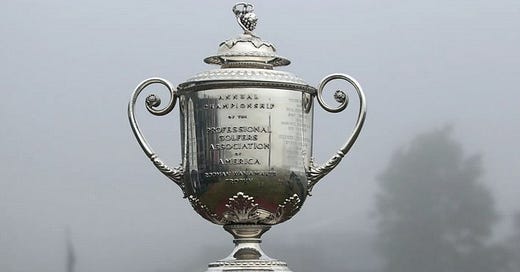In the grand theater of golf’s major championships, each event carries a distinct identity. The Masters seduces with its pristine familiarity and the symbolic gravitas of the green jacket. The U.S. Open promises a relentless test of resilience, while The Open offers a poetic journey through the game’s ancient roots. And then there’s the PGA Championship—a major whose defining character remains frustratingly elusive.
Despite its prestige and history, the PGA Championship often plays the role of the fourth sibling, less celebrated and less distinct. Yes, it offers a platform for PGA Professionals—those thousands of dedicated teaching pros who grow the game from the grassroots—but that alone doesn’t forge a unique identity. After all, these same professionals can qualify for the U.S. Open and The Open as well.
So, what is the PGA Championship’s place in the ecosystem of major championship golf?
A Tournament at a Crossroads
Founded in 1916, the PGA Championship is the flagship event of the PGA of America and is the only major exclusive to professionals. Originally a match play tournament, it showcased direct, high-stakes competition between the game’s elite. That format held until 1958, when the event transitioned to stroke play—a change driven largely by television broadcasters eager for predictable Sunday finishes and marquee names guaranteed to appear on screen.
At the time, it made sense. But today, in an era where golf seeks fresh engagement and sharper narratives, the PGA Championship has an opportunity: reclaim its roots and reestablish its identity by restoring match play—and returning to its traditional August timeslot.

Why Match Play Matters
The idea of reviving match play isn’t nostalgic sentiment—it’s a strategic differentiation. In a tour calendar saturated with 72-hole stroke-play events, match play remains a rarity, only surfacing in the Ryder Cup, Presidents Cup, and the soon-to-be-retired WGC-Dell Match Play. Yet its potential for drama and viewer engagement is immense.
Unlike stroke play, where golfers battle the course and the leaderboard, match play pits them directly against each other. Every hole is a new contest, every shot a possible momentum shift. The format rewards boldness and creativity and tests a player’s psychological fortitude in ways stroke play cannot replicate.
Imagine late-round matchups with star power: McIlroy vs. Koepka. Rahm vs. DeChambeau. Hovland vs. Schauffele. These aren't just golf matches—they're storylines waiting to be written, rivalries with potential to capture global attention, not unlike what we witness in the Ryder Cup.
For fans, broadcasters, and sponsors alike, match play offers a more intimate and emotionally charged viewing experience. And in a media landscape where attention is currency, that distinction is gold.
The Case for an August Return
The PGA Championship also suffers from a scheduling problem. Positioned in May—just four weeks after the Masters—it often feels like an afterthought. The Masters has a gravitational pull unlike any other golf event, and the emotional and media hangover it leaves rarely dissipates in a mere month.
Meanwhile, the four major championships are now jammed into a four-month window, diluting their individual impact and leaving the back half of the golf calendar flat. By moving the PGA Championship back to August, the PGA of America could provide breathing room for each major, while anchoring the late summer golf season with a signature event.
August scheduling also opens up venue flexibility—particularly in northern states where May conditions are often too unpredictable for a major. It creates space for a broader range of host courses, something that aligns with the PGA of America’s growing emphasis on regional diversity.
From a business standpoint, an August PGA Championship could boost media rights value, improve sponsorship opportunities, and offer a critical engagement bridge between The Open in July and the FedEx Cup Playoffs in September. At a time when the PGA Tour is seeking to retain viewership through the full calendar year, the move is both logical and necessary

.
A Vision for the Future
Here’s a bold, yet balanced, scheduling proposition:
March: The Players Championship
April: The Masters
June: The U.S. Open
July: The Open Championship
August: PGA Championship (in match play format)
This spread revitalizes the golf calendar, keeps audiences engaged, and gives each major space to breathe—while making the PGA Championship a true season closer that adds momentum heading into the playoff run.
Reinvention Through Tradition
The PGA Championship has history. It has pedigree. But what it lacks is identity. In a world where sports brands must fight for attention and meaning, standing apart is essential.
Reintroducing match play and reclaiming its place in August would not only differentiate the PGA Championship from the other three majors—it would reassert its value as a distinct, essential pillar of professional golf.
It’s time for the PGA of America to lean into its legacy—not by imitating others, but by embracing what made the PGA Championship special to begin with. Reinvention doesn’t always require innovation. Sometimes, it just requires the courage to return to your roots.






Nice post, Zach. 100% agree that the identity problem of the PGA Championship is real, and that the move to the May slot hasn't succeeded. (And I'm not even so sure what that move was supposed to achieve...)
I love the idea of Match Play format ... the danger is it would become a version of the Dell Match Play that could be terrible come Sunday evening. A Kisner-Kuchar Sunday wouldn't do much for ratings, right? And like it or not, the reality is that all decisions are made through the lens of TV viewership numbers.
All that said, I'd be in favour of trying it. It's far too beige as it is, and it could be great to have an annual Major Match Play, forcing players to play each other more than the course, which over a 10-year-plus time horizon would see a whole other side to many players' personalities.
So you've won me over :-)